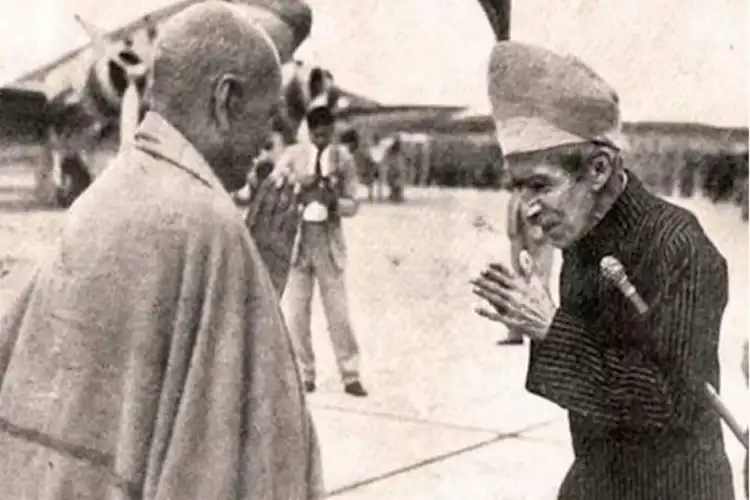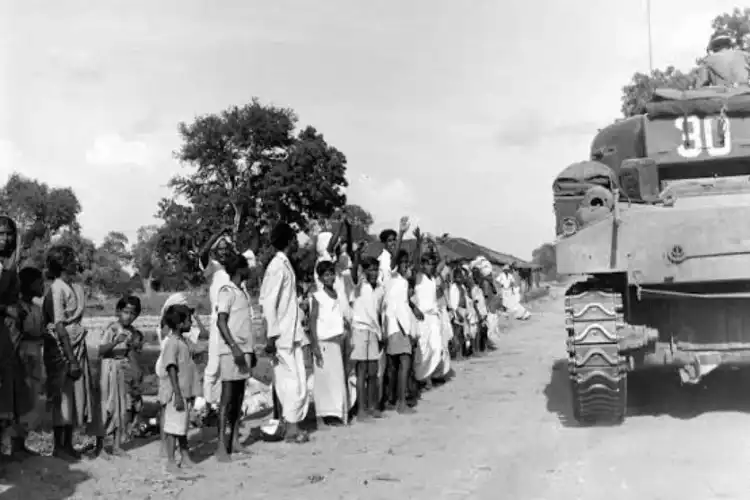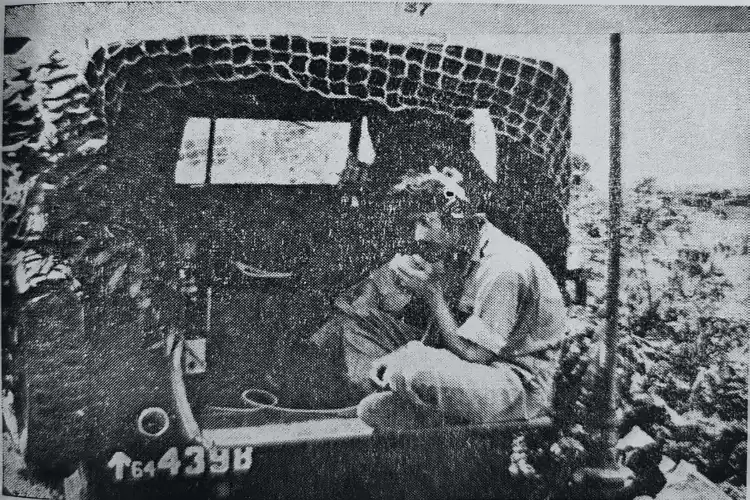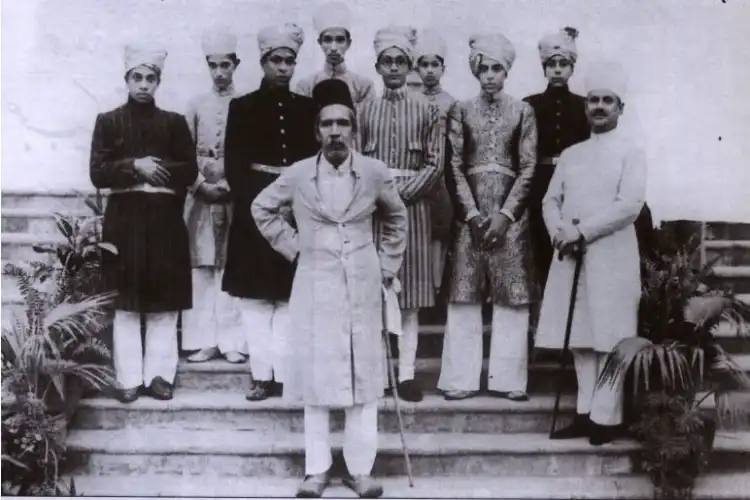
New Delhi
There was smoke and mirrors in this game of chess between the new Indian government and the wily Nizam. Adding to the hype, there was also some propaganda to the effect that Hyderabad aircraft would bomb cities like Bombay, Madras, Calcutta, and even Delhi. This propaganda caused a certain amount of apprehension among the people of the neighbouring provinces. Meanwhile, Mir Laik Ali, prime minister of Hyderabad, was pressing that the issue is taken to the United Nations.
The American Charge d'Affaires in New Delhi apprised the Government of India of the fact that the Nizam had written to the President of the United States requesting that he should arbitrate and that the latter had refused. The Razakars did not spare even missionaries and nuns. Early in September, the States Ministry received complaints that some foreign missionaries had been assaulted and some nuns molested by the Razakars.
The military view was that the campaign could not last beyond three weeks. Everything was over within less than a week. On September 9, 1948, after a careful evaluation of all the considerations and only when it was clear that no other alternative remained open, the Government of India took the decision to send Indian troops into Hyderabad to restore peace and tranquillity in the state and a sense of security in the adjoining Indian territory.
This decision was communicated to the Southern Command, who ordered that the Indian forces should march into Hyderabad in the early hours of Monday the 13th. The Indian forces were commanded by Major-General J.N. Chaudhury under the direction of Lt-General Maharaj Shri Rajendrasinhji, who was then the General Officer Commanding-in-Chief, of Southern Command. This action, euphemistically called 'Police Action', was given the name ‘Operation Polo' by the Army Headquarters.

Locals of Hyderebabad watch as tanks of the Indian Army enter the city during Operation Polo
There was some stiff resistance on the first and second days. After this, resistance petered out and virtually collapsed. On the Indian side the total casualties were slight, but on the other side, owing to scrappy operations and lack of discipline, the Irregulars, and the Razakars suffered comparatively more casualties. The number of dead was a little over 800. Unfortunately, so many should have died in this action, though the number is insignificant when weighed against the killings, rape, and loot inflicted by the Razakars on the Hindus of the state.
On the evening of September 17, the Hyderabad army surrendered. On the 18th, the Indian troops led by Major-General Chaudhuri entered Hyderabad City. The operation lasted for barely 108 hours. On September 17, Laik Ali and his cabinet tendered their resignations.
The Nizam sent for K.M. Munshi (who had been under house arrest ever since the Police Action began) and informed him that he had given orders for his army to surrender; that he would be forming a new government; that Indian troops were free to go to Secunderabad and Bolarum; and that the Razakars would be banned. Munshi communicated this to the Government of India.
Major-General Chaudhuri took charge as Military Governor on September 18. The members of the Laik Ali ministry were placed under house arrest. Rizvi was arrested on September 19. There was not a single communal incident in the whole length and breadth of India throughout the time of the operation. There was universal jubilation over the swift and successful ending of the Hyderabad episode and messages of congratulation poured into the Government of India from all parts of the country.
The Hyderabad operation was very much controlled by Sardar Patel and V.P. Menon, it was not that Nehru remained oblivious to the developments there. He was fully involved in the run-up to the 'police action'. There was a degree of vacillation, but he left it to the Home and States Minister Sardar Patel to react with his typical spring-loaded action. The wide and varied correspondence on Hyderabad proves that.
In a letter to Sardar Patel, Nehru (his letters to different people are courtesy of different sources) wrote:
"We do not want to impose our will on any State and it is our earnest desire to avoid conflicts and quarrels ... We, therefore, concluded the Standstill Agreement with Hyderabad last year with the hope that in the year, the people's desires would be fulfilled. But no sooner the ink in which the agreement was signed was dry, the Hyderabad government violated the agreement.

Army moving in for Operation Polo
"Hyderabad is the only State where so far there has been no change like the government ... The Ittehad Muslemeen and its volunteers are committing violence on the people, trying to overawe and coerce them with bullets. The present state of affairs definitely cannot be allowed to go on."
In a speech at a secret session of the AICC, Bombay, on April 16, 1948, speaking of the policy on Hyderabad, Nehru said:
"I would like to assure the AICC that the Government of India is fully alive of the seriousness of the situation developing in Hyderabad State. ... If the Nizam's government or the Razakars take any aggressive action, the Government of India will certainly take steps to safeguard the interest of the people concerned."
Again, speaking at a public meeting, in Udhagamandalam (Ooty) on June 2, 1948, Nehru stated: "We have made it clear to Hyderabad that there will have to be a solution to this problem and that ultimately there must be accession. There is no other way, and Hyderabad can't walk out of the Indian Union. Responsible government is inevitable because in the modern world we cannot allow a feudal government as in Hyderabad to continue."
Writing to Vallabhbhai Patel on June 6, 1948, Nehru stated a similar view:
"To come back to Hyderabad, we have to view Military Action from the point of view of our present capacity as well as from the other consequences flowing from it. These consequences may be far-reaching to various parts of India and Pakistan. ... I concluded that Military Action should only be indulged in Hyderabad when the Hyderabad government or their Razakars etc make it impossible for us to desist from it. Of course, in such circumstances, we have to take action because inaction may produce worse results."
Nehru also took certain Interim Defence measures. There were instructions to Army commanders around Hyderabad and the local governments concerned. The instructions were as follows:
"Except for articles of food, salt, medical stores, and chlorine for purifying the water supply, all other articles should be denied entry into Hyderabad state and strict blockade should be maintained regarding these other articles."

Nizam of Hyderabad with his Ministers
On the other hand, Hyderabad was making frantic efforts to purchase arms. For this purpose, Major-General Syed Ahmed El Edroos, Commander of the Hyderabad State Forces, was sent to London and his mission was to get automatic weapons and anti-tank guns. He makes his views abundantly clear in the book he authored, 'Hyderabad of the Seven Loaves'.
Even regarding the position of the Hyderabad Army, he writes, "I realized the hopeless situation which we were in and any clash by our troops with the advancing Indian Army would have only led to ill feelings and probably harder terms of surrender. A copy of my plan was submitted to the Hyderabad Government.
"But the Government under the influence of the Prime Minister Mir Laiq Ali returned the copy with the remarks that he was the best authority in this vital matter and he was to hold the Indian Army at bay for about three months and by that time, help from Pakistan would come. He found it almost impossible for Hyderabad to purchase arms and ammunition from abroad as Hyderabad was not recognized as an independent country.
“Even if arms and ammunition were purchased from Europe or the Middle East, it would be impossible to import them into Hyderabad. Bombay, Madras, and other seaports were all closed to Hyderabad traffic. And it was next to impossible to get them through Goa due to the land route between Goa and Hyderabad being watched by the Indian authorities. But the Hyderabad Government ignored the clauses in the Standstill Agreement."
ALSO READ: Nizam Hyderabad: A family that ruled for 224 years
The leaders of Ittihad were delivering speeches that there would be a bloodbath in the whole of South India if accession to the Union was affected. Qasim Razvi also made many irresponsible speeches. He threatened, "If the Indian Union ventures to enter Hyderabad, the invaders will see the burning everywhere of the bodies of one crore and sixty-five lakh. The Muslims will not spare others when we are not allowed to exist."
